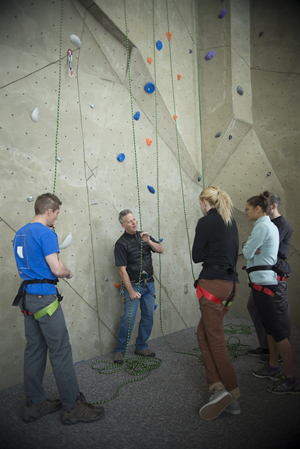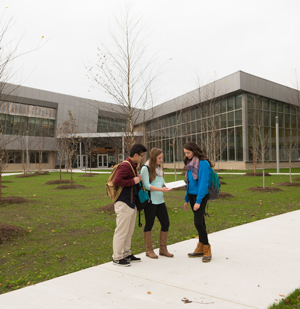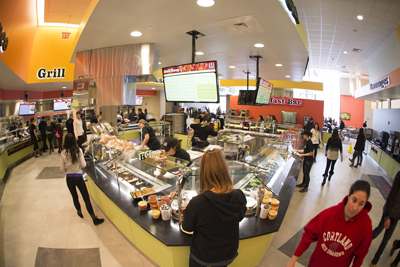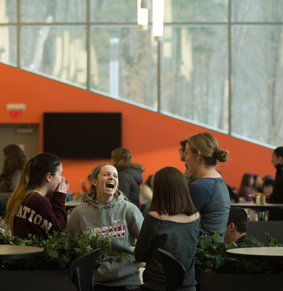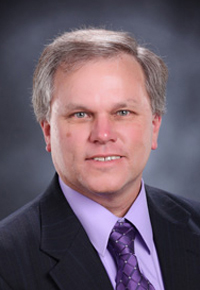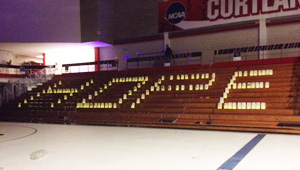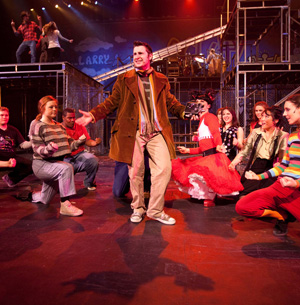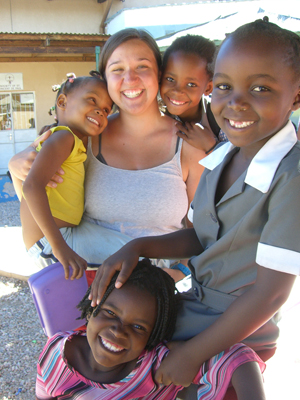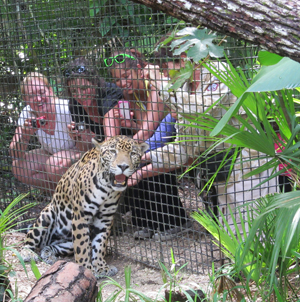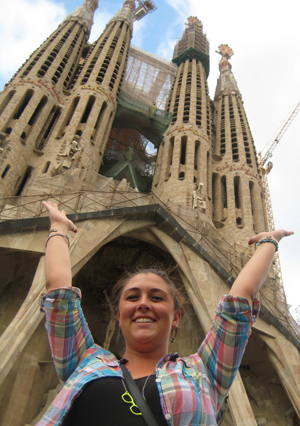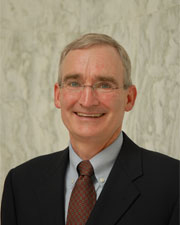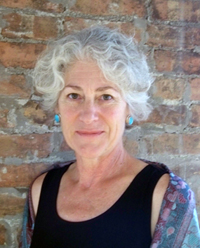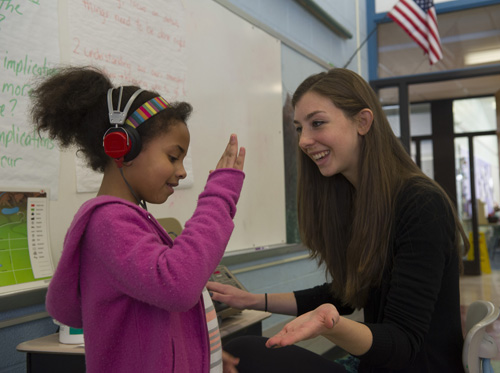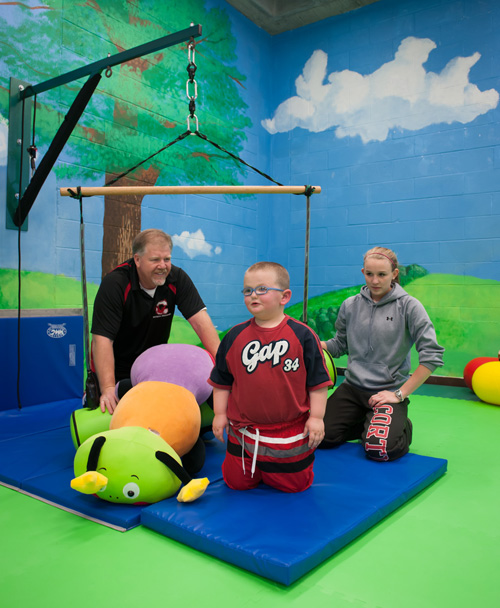|
|
|
Issue Number 10 • Tuesday, Feb. 10, 2015 |
Campus ChampionPolitics and good conversation go hand in hand for Xavier Campbell, a junior political science major from Queens, N.Y., who grew up sharing intense debates on hot button topics with his grandfather. “We’re in the generation that finally gets where we’re at as a nation,” he said. The aspiring governor of New York state says he would enact major changes. Until then, he’s happy discussing his two passions — politics and history. Xavier hopes to encourage lively dialog among his classmates with his upcoming Sandwich Seminar lecture, “African Americans in the Military,” Wednesday, Feb. 18, in Brockway Hall Jacobus Lounge. Tuesday, Feb. 10Dowd Gallery Artist’s Talk: Five of the 10 members of the Art and Art History Department exhibition, “Faculty Biennial 2015,” will present their work in this second of two events, Dowd Gallery, 5 p.m. Film Series: “Germany Year Zero,” (1948) as part of the Rubble Films: Classics of Post-1945 European Cinema, Sperry Center, Room 104, 7 p.m. Wednesday, Feb. 11 UUP Union Matters Chapter Meeting: Corey Union Function Room, 11:45 a.m.-1 p.m. Sandwich Seminar: “Morocco in the 21st Century: One Person’s Perspective,” Richard Kendrick, Institute for Civic Engagement and Sociology/Anthropology Department, Brockway Hall Jacobus Lounge, 12:30 p.m. Brooks Lecture Series: “Food Fight: When Genetic Engineering Makes Sense for Agricultural Sustainability,” Steven Broyles, Biological Sciences Department, Moffett Center, Room 2125. A reception begins at 4 p.m. in the Brooks Museum, Moffett Center, Room 2126. Wellness Wednesday Series and Black History Month Event: “Let’s Talk About Race: Who’s at Your Table?” Noelle Chaddock, Chief Diversity Officer, with selected interns, Corey Union Exhibition Lounge, 7 p.m. Friday, Feb. 13 Presentation: A representative of Gov. Andrew M. Cuomo will share the governor’s State of the State Budget presentation, Brockway Hall Jacobus Lounge, 10-11 a.m. R.S.V.P. Siblings Weekend, continues through Sunday, Feb. 15 Saturday, Feb. 14 Glow Skate: Park Center Alumni Arena, 9-11 p.m. Monday, Feb. 16 Student Life Center opens Tuesday, Feb. 17 Open Mic Night: Corey Union Exhibition Lounge, 7 p.m. Wednesday, Feb. 18 Study Abroad Fair: Corey Union Lobby, 11 a.m.-2 p.m. Black History Month Sandwich Seminar: “African Americans in the Military,” by Junior Xavier Campbell, political science major, Brockway Hall Jacobus Lounge, 12:30-1:30 p.m. Teacher Education Panel Discussion: “Cross-Cultural Miscommunication,” Corey Union Exhibition Lounge, 4-5:30 p.m. Wellness Wednesday Series: “Relationships: What Works—What Doesn’t,” an interactive discussion with Cathy Smith, health educator, and Steve Smith, senior counselor emeritus, Corey Union Exhibition Lounge, 7 p.m. Thursday, Feb. 19 Black History Month Sandwich Seminar: “I Can’t Breathe: Symbolic and Metaphorical Response of Africana Athletes to the Death of Eric Garner at the Hands of Police,” by Kharmen Wingard, senior admissions advisor, and Marques Dexter, assistant coach, Track & Field, Brockway Hall Jacobus Lounge, noon-1 p.m. Lecture: “Solitary Confinement in New York’s Prisons and Jails,” Sperry Center, Room 204, 3-4:30 p.m. Presentation: “Coevolutionary History,” by Edmund Russell, University of Kansas, as part of the Cultural and Intellectual Climate Committee’s series, r/evolution, Brockway Hall Jacobus Lounge, 4:30 p.m. Performance: “The Glass Menagerie,” Dowd Fine Arts Center Lab Theatre, 8 p.m. Friday, Feb. 20 Performance: “The Glass Menagerie,” Dowd Fine Arts Center Lab Theatre, 8 p.m. Saturday, Feb. 21 38th annual SUNY Cortland Residence Life Conference: Corey Union Performance: “The Glass Menagerie,” Dowd Fine Arts Center Lab Theatre, 8 p.m. Sunday, Feb. 22 Performance: “The Glass Menagerie,” Dowd Fine Arts Center Lab Theatre, 2 p.m. |
Student Life Center Grand Opening Planned02/10/2015The Grand Opening for the new Student Life Center (SLC) is scheduled for 11 a.m. Friday, March 13, in the center's multi-activity court (MAC). Open for use since Feb. 16, the campus community has enjoyed the numerous recreational activities offered at the center. Students, faculty and staff who have a valid sticker on their student or employee ID card can pursue a wide variety of diverting and healthy leisure activities within the two-story, almost 150,000 square foot facility located off Pashley Drive on the site of the former Davis Field. Participants will take their exercise or unwind while bathed in natural sunlight from the giant windows of this visually striking, high-ceilinged $56 million facility with its custom-designed playing surfaces, state-of-the-art heating and ventilation system, environmentally friendly features and universal physical accessibility. “The Student Life Center will provide the campus with a place for a sense of community,” said Julian Wright, the College’s recreational sports director, who wrote his first memo suggesting just such a facility some 22 years ago. “We’ll have the most comprehensive recreation facility in all of SUNY,” he said.
“One of the biggest arguments we made for the SLC was that it would be a great alternative to going downtown,” Wright said. “If you’ve got a great atmosphere and healthy, wholesome kinds of things to do, it definitely will make a difference.” The center is a long time coming. Two College presidents, Judson H. Taylor, emeritus, and currently Erik J. Bitterbaum, wholeheartedly endorsed the project and, in 2007, funding was secured through the efforts of politicians including Sen. James L. Seward, R-Oneonta, Assemblywoman Barbara Lifton, D-Ithaca, and Martin “Marty” Mack M ’76, a graduate who is well-connected in New York state government. The new facilities replace and expand on the existing recreational sites that were scattered among many different buildings around campus, often sharing spaces with students in classes or on varsity teams. Additionally, the building greatly increases the number and types of activities where members of the campus community can relax and socialize informally. “You will be able to go to the SLC with your friends and choose among 20 different things to do, all in close proximity,” Wright said. “In the pool alone you can do at least five different things and not interfere with anyone else in the pool.” Student life centers are springing up on campuses across the U.S., but not so much in the northeast and seldom in the State University of New York system, Wright noted. “I changed the concept from the facility being merely a recreation center,” Wright said. “Because what we really wanted was a student life center. A student recreation center has all the physical recreation components including fitness facilities, a track, a swimming pool, courts, all the things that you do for fitness and exercise. A student life center has all those amenities along with social components: a game room, lounge areas and, of course, food. Not only can you get a good workout but you also can hang out and socialize with your peers.” SUNY Cortland retained two signature design companies, Hastings+Chivetta in association with H2L2 Architects/Planners LLC, to plan this long sought-after facility to bring together all the campus recreation areas as well as dining, social and meeting spaces. “The thing that’s really exciting to me is this is a place that will always be available to students, and our faculty and staff, too, reached by a swipe of their I.D. card,” Wright said. “With a very few exceptions, such as the spinning room, the mind-body room and the climbing wall, the space is not to be scheduled, it will always be available to students. If you want to go swimming, play basketball, run the track, or work out in the fitness areas, you can do all of these things from 6 a.m. to midnight.” The new building makes a bold statement both in terms of size and appearance. The walking/jogging track, in particular, commands attention. Like the early science fiction television cartoon “The Jetsons,” visitors will zip along a one-fifth mile elevated route above the onlooker’s line of vision atop a mezzanine reached by a giant staircase. “It’s our biggest ‘wow’ item,” said Joseph Westbrook, project coordinator in the College’s Facilities Planning, Design and Construction Office. “I think that it’s the SLC’s signature feature in the sense that it’s one of the biggest out there. The track goes up and down contoured ‘hills’ twice, about 20 inches up or down, and is accessible to users at all levels of mobility.” The facility’s open floor plan allows visitors to see from one activity area to the next and to enjoy the exterior views of mountains, woodlands and surrounding campus through the massive windows. The SLC is organized in two wings with a common lobby and entrances on both sides. A 343-seat food court, Recreational Sports’ new Outdoor Pursuits Center and a retail snack bar are located in the north wing. Student recreation space is located in the south wing along with administrative offices. A concourse runs north-south and connects directly to the two-level fitness areas, a flexible meeting space, swimming pool, gymnasia and multi-purpose spaces.
The building was designed and constructed to seek the industry’s highest measurement of environmental sustainability for new facilities, Leadership in Energy and Environmental Design (LEED) certification through the U.S. Green Building Council. The designers have worked to achieve the top level of green construction, LEED Gold certification. “That’s a difficult goal for any multi-windowed, high-ceiling structure such as this one,” Westbrook noted. The project meets the green target in many different design categories, and includes a rooftop that houses a portion of the College’s 3,600-panel electricity-generating solar panels, Westbrook noted. The total solar installation was the first of its kind in the SUNY system and earned SUNY Cortland both the Innovation and Excellence in Energy Management Award and the People’s Choice Award from Gov. Andrew Cuomo’s initiative for energy efficiency and sustainability in state-owned properties, called BuildSmart NY. “This building type is not especially friendly to heating, ventilation and air conditioning systems but the designers worked diligently to meet our desire for LEED certification above and beyond SUNY requirements,” Westbrook added. “People ask us all the time what the jet fans under the track are for. They move air into the central area, where giant fans located on the ceiling circulate the conditioned air back downward, where the people are.” As the center lies close to the community’s ground water supply, some of the LEED certification measures involved the creation of a “bio swale” area to reduce the building’s impact on flooding. “Water runoff is managed with large rain gardens, permeable pavement and sub-surface, man-made structures,” Westbrook noted. The building was designed such that individuals who have limited mobility or another access issue will be able to reach every recreational area, including getting into and out of the pool, Westbrook noted. Visitors can sample many recreational features inside the SLC, including:
Access to all the facilities listed above is free for current and retired faculty, staff and ASC staff members. However, all participants must have completed a physical activity readiness questionnaire form before using the fitness facilities in the new Student Life Center. This can be done once a year and is available online at the cortland.edu/recsports website. Select “Fitness Facilities” and then “Faculty/Staff Registration.” Or fill it out at the new Recreational Sports Office in Student Life Center, Room 1201. Carnegie Recognizes Community Engagement01/26/2015SUNY Cortland has re-earned the community engagement elective classification from the Carnegie Foundation for the Advancement of Teaching, becoming the first institution in the State University of New York system to hold the reclassification distinction. It means the College will keep the Carnegie Foundation’s prestigious community engagement endorsement for 10 years, through 2025. Fewer than 400 campuses nationwide can claim the designation and only 157 obtained re-classification in 2015. “This truly is an exceptional accomplishment for our college because, in many ways, the reclassification process was more rigorous than obtaining our initial classification,” said Richard Kendrick, the director of the College’s Institute for Civic Engagement (ICE) and a professor of sociology/anthropology. “Reclassification signifies that we have strengthened and deepened our institutional commitments to the many communities of which we are a part. “It’s an honor that reflects extremely well on the relationship between our campus and our community. I am thrilled that we have again been recognized in this way.” SUNY Cortland’s 61-page application, which focused on accomplishments during the 2012-13 academic year, highlighted the contributions of every campus division (academic affairs, finance and management, institutional advancement and student affairs) and all three academic schools (arts and sciences, education and professional studies). “At our college, community engagement isn’t just what we do, it’s part of who we are,” said SUNY Cortland President Erik J. Bitterbaum. “It gives me great pride to know that educating students to become good citizens is central to our mission and ingrained in our culture. “It is woven into our curriculum and demonstrated in the community through the energy and involvement of our students and faculty.” The Carnegie Foundation first offered the community engagement classification in 2006 and SUNY Cortland became the first campus in the SUNY system to earn it in 2008. Rather than relying on national data, the designation is elective, meaning institutions apply for it by submitting materials that detail their institution’s service. Several projects, programs and partnerships benefitting both the not-for-profit and for-profit sectors were highlighted in SUNY Cortland’s application.
In 2014, for the eighth consecutive year, SUNY Cortland was named to the U.S. President’s Higher Education Community Service Honor Roll. It also marked the fourth year in a row the College earned “with distinction” honors. The 2012-13 academic year saw 3,553 students contribute 204,024 community service hours. SUNY Cortland’s Carnegie application process was overseen by a steering committee representing every division of campus. The group included Cynthia Guy, community innovation coordinator for ICE; Amy Henderson-Harr, assistant vice president for research and sponsored programs; Christopher Kuretich, assistant vice president for student affairs; Mary K. Murphy, interim vice president for finance and management; Frederic Pierce, director of public relations; John Shirley, director of career services; John Suarez, service-learning coordinator for ICE; and LeighMarie Weber ’14, former Student Government Association president. Three readers for the College’s overall application included Virginia Levine, executive assistant to the president; Lori Schlicht, associate director of advisement and transition; and Carol van der Karr, associate provost for academic affairs. The full listing of institutions that hold the community engagement classification can be found on the New England Resource Center for Higher Education website. Capture the MomentAs part of the lab component for PED 356: Adapted Physical Education and Sport, SUNY Cortland undergraduates work up creative lessons to teach youngsters from the local Onondaga-Cortland-Madison (OCM) BOCES. Jenelle McDonald, a junior physical education major from South Glens Falls, N.Y., last week led youngster Nicholas Gleason in a jumping activity inside Park Center, Room 2213. In Other NewsPanel Explores Cross-Cultural CommunicationEducation majors will learn ways of addressing communication challenges with students from different cultures during a SUNY Cortland panel discussion on Wednesday, Feb. 18. The bi-annual event, “Cross-Cultural Miscommunication: A Panel and Audience Discussion,” takes place from 4 to 5:30 p.m. in the Corey Union Exhibition Lounge. It is free and open to the public. Different cultures often can have varied interpretations of concepts such as time, personal space and idiomatic expressions. Although these differences may seem like barriers, event organizers suggest that varying life experiences of students can present opportunities that were initially overlooked. “A child may have lived in a situation that required resilience and perseverance; those qualities are strengths on which teachers can draw to help their students learn,” said John Suarez, the College’s service-learning coordinator. “Through our panelists’ descriptions, our (education majors) will learn about specific challenges and opportunities in diverse classrooms so that they – our education majors – learn ways of addressing challenges, and they learn ways of building on opportunities for their students’ benefit.” The seven-person panel includes three SUNY Cortland students who have experience in the cross-cultural education field. The others are education professionals who can offer insight into the increasingly global field of education. Panelists include:
The panelists first will share their experiences then invite audience members to ask questions and share their own stories related to cross-cultural communication. The talk is sponsored by SUNY Cortland’s Institute for Civic Engagement, Clark Center for International Education and International Programs Office. For more information, contact Suarez at 607-753-4391. Prepared by Public Relations Office intern Sarah Kelly Gov. Cuomo’s Budget ExplainedFormer Syracuse Mayor Matt Driscoll will present Gov. Andrew M. Cuomo's 2015 Opportunity Agenda, which outlines the goals of Cuomo's proposed state budget, at SUNY Cortland on Friday, Feb. 13. All members of the campus community are invited to the presentation and discussion of the $141.6 billion spending plan, scheduled from 10 to 11 a.m. in Brockway Hall Jacobus Lounge. The governor’s plan includes sweeping changes to public education, continued emphasis on the SUNY system as an economic engine, small business tax cuts, a proposal for limited student loan forgiveness and other issues of interest to faculty, staff and students of SUNY Cortland. Members of the public are invited as well. Driscoll is currently president and CEO of the New York State Environmental Facilities Corporation, the arm of Governor Cuomo's administration that provides low-cost financing to local governments for wastewater and drinking water infrastructure. Friday's presentation is one of many regional budget presentations scheduled throughout New York state, as Gov. Cuomo seeks to win public support for his plan, which needs approval by the New York State Legislature. After the presentation Driscoll will be available to answer questions. ‘Wellness’ Series Offered to Campus, CommunityIn keeping with a College priority of wellbeing, each semester SUNY Cortland makes a weekly commitment to encouraging the entire campus and community in the pursuit of a lifetime of good health. The Spring 2015 “Wellness Wednesday Series” will feature speakers and panels, informational fairs, self-help workshops, demonstrations and other programs intended to encourage campus and community members to learn more about health and wellness. Programs continue through the spring semester with events including a yoga session for beginners; a conversation about race; discussion on hazing and how to avoid it in the college experience; a couple’s discussion on avenues to healthy man-woman relationships; parents sharing their insights into a daughter’s eating disorder; an uplifting experience inside the College’s new Planetarium; and information and demonstrations on choosing and preparing healthy meals. Primarily sponsored by the Health Promotion Office and the Student Development Center, the series will take place on Wednesdays at 7 p.m. in Corey Union Exhibition Lounge, unless otherwise noted. The events are free and open to the public. • On Feb. 11, the College’s Multicultural Life and Diversity Office will address race, place and belonging at SUNY Cortland in a panel roundtable titled “Let’s Talk About Race: Who’s At Your Table?” As an institution, SUNY Cortland continues to work on inclusion, equity and access for all community members. This requires careful and intentional attention to both broad and specific issues. “This conversation is intended to be about race — as we are all raced — and the impact of race on the campus,” said Noelle Chaddock, director of the Multicultural Life and Diversity Office. Participants are invited to bring their lived experience, questions, concerns and curiosity. For more information, email multicultural.life@cortland.edu. • Husband-and-wife team Cathy and Steve Smith will offer an interactive discussion called “Relationships: What Works — What Doesn’t,” on Feb. 18. Cathy Smith is the College’s health educator and Steve Smith is a senior counselor emeritus. • National presenters Doris and Tom Smeltzer, the parents of a college student who lost her life to an eating disorder, will present the Wellness Wednesday discussion on Feb. 25. Their talk, “Andrea’s Voice: Silenced by Bulimia,” will focus on eating disorders, from a daughter’s insights to a parent’s perspective. Bright, talented, creative — Andrea's voice was silenced when she died after a one-year struggle with bulimia. Her parents will share her compelling story as well as vital information on eating disorders. The event takes place in Corey Union Function Room. A book signing will follow. • Danni Perratto, residence hall director in SUNY Cortland’s DeGroat Hall, will offer an educational presentation on hazing at 7:30 p.m. March 4 in Corey Union Function Room. Her talk, “Have You Ever . . .” is geared to a wide audience and aims to answer the questions “what,” “when,” “why” and more.
• On March 11, the College’s team of health promotion interns will staff a “Safe Spring Break Fair” from 11 a.m. to 2 p.m. on the Corey Union first floor. The students assisting the Health Promotion Office will offer fun activities and helpful hints for a safe and healthy spring break. • Andrea Hart, the nutritionist with the College’s Auxiliary Services Corporation, and health promotion interns will give tips for making healthy eating choices both on and off campus from 10 a.m. to 4 p.m. on March 25 in the Student Life Center. Hart and the health promotion interns will offer advice, games and a raffle for prizes at tables in the lobby outside The Bistro Off Broadway as one part of the day’s “Bite Into a Healthy Lifestyle” program. Simultaneously, inside the dining facility at the “Bistro Live!” area the ASC’s chefs will present cooking demos and taste tests. Hart will join them at times to narrate on the healthy aspects of the food preparation display. • A panel of students, faculty and staff will discuss the intersection between religion and spirituality on April 1. The “Spirituality, Religion and You” panel will include campus ministers Shawn Allen and Rev. Vicki Johnson. • On April 8, SUNY Cortland’s Sexual Assault Awareness and Programming Committee will present a panel discussion on key aspects of stopping sexual assault on campus. The program, “It’s On Us: Let’s Talk About It,” will address prevention, communication and affirmative consent. • The Physics Department will host a “night” star trek of the Earth’s universe, complete with constellation myths and cultural ties, twice on April 15 in the College’s brand new Bowers Hall Planetarium. The show, “Our Place in the Universe,” runs at 3 p.m. and again at 7 p.m. Participants will view a strikingly realistic night sky showing what constellations, planets and other astronomical objects one can see with the naked eye. Included are the associated Greek myths, a discussion of humanity’s place in the universe and cultural ties with the stars, planets and Sun. • On April 29, as final exams loom, Health Promotion student interns will offer “Get Your Game On!” A variety of interactive games are planned to help the classmates de-stress. The evening will feature refreshments and prizes. For more information or to arrange accommodation to attend an event, contact Catherine Smith in Van Hoesen Hall, Room B-1, at 607-753-2066. Genetic Modified Crops is Feb. 11 TopicSteven Broyles, professor and chair of SUNY Cortland’s Biological Sciences Department, will discuss the pressing issues surrounding the role of genetically modified food in global sustainability on Wednesday, Feb. 11. His talk, titled “Food Fight: When Genetic Engineering Makes Sense for Agricultural Sustainability,” will begin at 4:30 p.m. in Moffett Center, Room 2125. Broyles, a 2002 recipient of the SUNY Chancellor’s Award for Excellence in Teaching, will examine the scientific evidence regarding the safety of such foods and the arguments for their role in the sustainability of global food provision. A reception will precede his presentation at 4 p.m. in the Rozanne M. Brooks Museum, Moffett Center, Room 2126. The Brooks series events are free and open to the public. His lecture continues the 2014-15 Rozanne M. Brooks Lecture Series, themed this year on “Culture, Technology and Sustainability.” The series explores the present and future on a planet with a rapidly growing population, critical food shortages, climate change and a host of other factors that affect the quality of life across the world. Presenters will discuss these issues and offer possible solutions to major global problems, including the role technology may play in helping or hindering progress toward a “livable planet.”
A botanist, Broyles has a bachelor’s degree from University of North Carolina at Charlotte and master’s and doctoral degrees from the University of Georgia. A member of the SUNY Cortland faculty since 1992, Broyles teaches Biological Sciences I, Field Natural History, Field Biology at Raquette Lake, Ornithology, Biology of Trees, Conservation Biology Seminar, and Neotropical Biology. Plant genetics is the focus of some of the considerable volume of research he has published in journals that include Evolution, American Naturalist, Journal of Heredity, Annual Review of Ecology and Systematics and American Journal of Botany. Broyles has long enjoyed accolades as a scholar and teacher. His doctoral dissertation, “The Reproductive Biology of Poke Milkweed, Asclepias exaltata L.: Population Structure, Mating Patterns, Pollen Dispersal and the Evolution of Inflorescence Size,” was recognized by the University of Georgia with the 1993 Sigma Xi Outstanding Ph.D. Dissertation Award. The university also presented him with its Outstanding Graduate Teaching Award in 1990 and its Outstanding Teaching Award in 1992. The Botanical Society of America presented Broyles with its 1991 Margaret Menzel Award for Outstanding Paper in Plant Genetics. The Conference of Southern Graduate Schools awarded him its 1990 Outstanding Thesis Award in Natural Sciences and Mathematics. In 1989, he was recognized by the Association of Southeastern Biologists both for best student paper in ecology and for student research. He was inducted into the interdisciplinary honor society Phi Kappa Phi and the Blue Key National Honor Fraternity. In 2012, SUNY Cortland presented him with its highest honor for faculty, the Rozanne M. Brooks Dedicated Teacher Award. A frequent invited speaker by local community groups on a range of different biological subjects, Broyles oversaw the Cortland Tree Survey from 2004 to 2005 as a service learning course for his students to examine, evaluate and identify Cortland street and park trees. He chaired the City of Cortland’s Water Board from 2002 to 2003. The 2014-15 Brooks Lecture Series is sponsored by a grant from Auxiliary Services Corporation and the Cortland College Foundation. For more information, contact Sharon R. Steadman, SUNY Cortland professor of sociology/anthropology and Brooks Museum director, at 607-753-2308. Students Get Ready to Relay for LifeMembers of SUNY Cortland’s Colleges Against Cancer (CAC) student group are working tirelessly on their annual Relay for Life event, set for Saturday, March 28. The reason is simple, according to club president Shannon Boreali. “The premise of Relay is that cancer never sleeps, so we shouldn’t either,” Boreali said. This spring’s all-night event will take place from 3 p.m. to 3 a.m. in Park Center Alumni Arena. It will follow a Disney theme and will be built around the slogan: “When you wish upon a star, a cure to cancer is never far.” Participants can enjoy food, entertainment and the regular staples of Relay for Life events, which include laps around the arena’s indoor track and a luminaria ceremony to honor those who are battling or died from cancer. CAC hopes to raise $30,000 from donations, t-shirt proceeds and other sales. SUNY Cortland students, employees and local community members can sign up and support the Relay for Life effort any time leading up to this year’s spring celebration. “You usually can’t go a day without hearing a mention about the disease,” said Boreali, a junior inclusive special education major from Grand Island, N.Y. “Everyone who attends Relay shares that same goal of finding a cure.” Boreali joined the cause as a high school sophomore, when her grandfather lost his battle with pancreatic cancer. When she came to college, she knew where to channel her extracurricular energy. “Instead of being angry and upset about it, I wanted to jump in with both feet and give back,” Boreali said. “That’s how all of our group members feel.
“We have a group of about 20 that’s just so dedicated because cancer has touched their lives in some way.” The cause brings countless campus clubs to SUNY Cortland’s hockey arena, with students sticking around throughout the night for the laid-back atmosphere and different activities. This year’s entertainment will include inflatable obstacles, a caricature artist and a DJ as well as performances by the College’s Danceworks, Kickline and other student groups. Students can join a team on the Relay for Life website or they can start their own with just a few members. “Relay’s just a great atmosphere to be a part of, even if you haven’t been affected by cancer,” Boreali said. “There’s just so much positivity and hope. “It’s contagious.” Six Appeal to Offer A Cappella Concert Feb. 27Award-winning vocal ensemble Six Appeal will bring its high energy performance to SUNY Cortland on Friday, Feb. 27. The all-male a cappella group will sing classic oldies, current chart toppers and catchy original tunes starting at 7 p.m. in Old Main Brown Auditorium. Presented by the Campus Artist and Lecture Series (CALS), admission to the show is free for SUNY Cortland students with College ID and children ages 10 and under. The general admission is $5. Tickets can be purchased through the Campus Activities and Corey Union Office, Corey Union Room 406, weekdays from 8:30 a.m. to 4 p.m., or at the door one hour prior to the performance. For more information, call 607-753-5574. Six Appeal has performed from coast to coast at a multitude of venues and events, including live on ESPN at the 2013 Allstate Sugar Bowl. The group’s varied repertoire not only spans genres but decades. What began as a hobby while a few founding members attended Concordia College in Moorhead, Minn., back in 2006 progressively evolved into a professional ensemble by 2010. Soon the group began introducing new members, creating the current dynamic and sound as a sextet. Presently, members of Six Appeal bring together a combined more than 75 years of musical experience. To turn hobby into passion and gain a secure and definite spot within the a cappella community, Six Appeal moved their home base to Minneapolis in 2010. In 2012, Six Appeal won the National Harmony Sweepstakes Championship in San Rafael, Calif. In addition to the first place title, the group also captured “Best Original Song” as well as the coveted “Audience Favorite” award. Members hold secondary level education degrees in classroom music, musical composition, vocals and performance. An essential part of Six Appeal members’ mission is to spread their love for music to varying audiences and to empower young singers with hands-on experiences through their educational outreach program. Six Appeal is made up of Jordan Roll, Michael Brookens, Trey Jones, Nathan Hickey, Reuben Hushagen and Andrew “Berko” Berkowitz. For more information about the performance and Six Appeal, visit the website glberg.com/six_appeal/. For more information about this and other CALS events, visit the website cortland.edu/events/cals. Prepared by Public Relations Office intern Kathryn Monno Spring 2015 Performing Arts Schedule SetProductions of the classic Tennessee Williams drama “The Glass Menagerie” and the Broadway hit musical “Legally Blonde,” as well as a host of recitals, concerts and dance demonstrations make up an exciting Performance Arts Department schedule during Spring 2015 at SUNY Cortland. With the exception of the play and musical, all performances are free and open to the public and all are staged in the College’s Dowd Fine Arts Center, which is located at the corner of Graham Avenue and Prospect Terrace. “The Glass Menagerie,” considered to be American playwright Williams’ first successful drama, comes to the SUNY Cortland stage with four shows directed by Mark Reynolds, instructional support assistant. “The Glass Menagerie” will be offered at 8 p.m. on Thursday, Feb. 19, Friday, Feb. 20, Saturday, Feb. 21; and at 2 p.m. on Sunday, Feb. 22. All performances take place in the Dowd Fine Arts Center Lab Theatre. Ticket prices for "The Glass Menagerie" are $6 for students with ID and $10 for general admission. Tickets may be purchased at the door. Department faculty members Marion Giambattista, soprano, Gary Moulsdale, tenor, and Alan Giambattista, piano, will present a program of 19th- and 20th-century art song Tuesday, Feb. 24, in Dowd Center, Room 110. The concert, which begins at 7:30 p.m., will feature selections from song cycles by Francis Poulenc’s “Banalités,” Samuel Barber’s “Despite and Still,” Hector Berlioz’s “Les nuits d'été” and Richard Strauss’ “Op. 27.” The semester will feature two “Friday at Four” and two “Wednesday at Four” student recitals, which are overseen by Professor David Neal. All begin at 4 p.m. Both “Friday at Four” concerts take place in Dowd Center, Room 110, with the first on Feb. 27 and the second on March 27. The “Wednesday at Four” concerts are on March 11 in Dowd Center, Room 10, and April 29 in Dowd Center, Room 110.
“Legally Blonde,” with music and lyrics by Laurence O’Keefe and Nell Benjamin, is based on the novel Legally Blonde by Amanda Brown and the 2001 film of the same name. Directed at SUNY Cortland by Associate Professor Kevin Halpin, “Legally Blonde” will take the stage in the Dowd Fine Arts Center Theatre for six performances, including four evening shows at 8 p.m. on Friday, April 10; Saturday, April 11; Friday, April 17; and Saturday, April 18; and two Sunday matinee performances at 2 p.m. on April 12 and April 19. Ticket prices and other details for "Legally Blonde" will be forthcoming. The College Singers, a touring group of mixed voices, will give a concert at 3 p.m. on Sunday, April 26, in the Dowd Fine Arts Center Theatre. Professor Stephen Wilson will lead the ensemble. The College-Community Orchestra will perform at 8 p.m. on Tuesday, April 28, in the Dowd Fine Arts Center Theatre. Ubaldo Valli, lecturer, will direct the concert. The Choral Union, a large chorus mixing students and community members, will take place at 8 p.m. on Tuesday, May 5, in the Dowd Fine Arts Center Theatre. Professor Stephen Wilson will direct. Performing Arts Department students will present a “Dance Demonstration” at 7 p.m. on Friday, May 8, in the Dowd Fine Arts Center Theatre. For more information, visit the Performing Arts Department website or call 607-753-2811. Study Abroad Scholarships PresentedSUNY Cortland recently awarded more than $54,000 in scholarships and exchange awards to help 64 students expand their educational horizons through study in Chile, Turkey, India, Germany and many other countries. The College, through its International Programs Office, will provide $43,460 in scholarships so 62 students can study abroad during the 2015 winter session or spring semester. Additionally, through the IPO’s many exchange agreements with international universities, two SUNY Cortland students will receive tuition waivers and grants totaling $11,095 in exchange value to help pay for their international study. Along with a more than 15 percent increase in direct scholarship funding since last year, the College is giving scholarships to a growing number of students asking for them. “To advance our Generation Study Abroad goal of doubling the number of Cortland students studying abroad by 2020, we strive to help students identify resources to support their participation and provide programs that are affordable, academically relevant to their studies, and aligned with their personal and professional goals,” said Mary Schlarb, director of international programs. She was referring to the College’s participation, announced last March, in a national initiative of the Institute of International Education (IIE). “Members of the SUNY Cortland family contribute to these efforts in many ways, from supporting scholarship funds, to encouraging students to explore the world, to providing the flexible administrative support required when working across international boundaries,” Schlarb said. Recipients were selected based on criteria that included high academic achievement, financial need, involvement in extracurricular activities, a personal essay and letters of recommendation. A description of the scholarships and the award recipients appears below: Overseas Academic Program (OAP) Award Overseas Academic Program (OAP) scholarships are awarded to students accepted in a study abroad program. The scholarship is for amounts between $200 and $400 for winter recipients and between $500 and $950 for spring recipients. Three winter 2015 OAP recipients traveled abroad for fieldwork related to a course in Belize: History, Arts and Culture: • Dylan Ferrier, a senior history major from Middletown, N.Y.; • Kelli Grossmann, a sophomore art and art history major from Miller Place, N.Y.; and, • Amanda Sacca, a junior speech and hearing science major from Latham, N.Y. Two winter 2015 OAP winners used their scholarship for academic work at Fulda University, Germany: • Justine Marschner, a junior communication studies major from Nassau, N.Y.; and, • Elizabeth Saltman, a junior sociology major from Huntington, N.Y.
Additional spring 2015 OAP Scholarship winners include: • Morgan Blueglass, a senior psychology major from Mahopac, N.Y., to complete a Projects Abroad service learning assignment in Jamaica; • Samantha DeCarlo, a senior psychology major from Canastota, N.Y., for studies in New Zealand through SUNY Brockport; • Adrianna Holness, a senior political science major from Huntington Station, N.Y., to complete an internship in Belize; • Kellie Lynch, a senior art and art history major from Stony Brook, N.Y., for scholarship in Rio Piedras, Puerto Rico, through SUNY Fredonia; • Sheryl Mathew, a junior speech and hearing science major from Sparkill, N.Y., for academic work in the Dominican Republic through University at Albany; • Sarah Prieto, a junior inclusive special education major from East Elmhurst, N.Y., to complete an international education experience in Costa Rica; • Matthew Savino, a senior criminology major from Seaford, N.Y., for studies in Italy and Greece through SUNY Brockport; • Katherine Stroman, a junior speech and hearing science major from Binghamton, N.Y., for scholarship at the Spanish Language Institute in Mexico. • Lauren Vass, a senior childhood/early childhood education major from Elmont, N.Y., for academic work in Greece through SUNY Brockport; and, • Aubrey VanDeusen-Ingraham, a junior history major from Chenango Forks, N.Y., for studies in Santiago, Chile, through University at Albany. Six spring 2015 OAP winners used their award for scholarship at the University of La Rochelle in France: • Cosette Austin, a sophomore communication studies major from East Northport, N.Y.; • Ivy Donahue, a senior French major from Binghamton, N.Y.; • Melissa Duluc, a senior English major from New City, N.Y.; • Alyssa Morga, a junior international studies major from Massapequa, N.Y.; • Amanda Rose, a sophomore criminology major from New Paltz, N.Y.; and, • Alyssa Smeding, a sophomore business economics major from East Northport, N.Y. Three spring 2015 OAP winners used their award to complete their student teaching requirement in Australia: • Padraic Bailey, a senior physical education major from Niskayuna, N.Y.; • Megan Demody, a senior childhood/early childhood education major from Syracuse, N.Y.; and, • Mary Kopcienski, a senior physical education major from Spencerport, N.Y. Three spring 2015 OAP winners used their award for scholarship at the University of Salamanca in Spain: • Valerie Alvarez, a sophomore physical education major from Wood Ridge, N.J.; • Darien Cruz, a sophomore exercise science major from Ronkonkoma, N.Y.; and, • Elizabeth Gomez, a sophomore teaching English as a second language major from Plainview, N.Y. Two spring 2015 OAP winners used their award for scholarship in the United Kingdom at London Metropolitan University: • Sarah Cerbone, a sophomore communication studies major from Tarrytown, N.Y.; and, • Cory Laga, a junior sport management major from Park Ridge, N.J. Two spring 2015 OAP winners used their award for studies in Ireland at University College Cork: • Kelley McGinnis, a sophomore inclusive special education major from Livonia, N.Y.; and, • Stephanie Clarkin, a junior adolescence education: mathematics major from Commack, N.Y. Two spring 2015 OAP winners used their award for academic work at Deutsche Sporthochschule in Cologne, Germany: • Adriana Babak, a junior exercise science major from Valhalla, N.Y.: and, • Lauren Vaughan, a junior physical education major from Fayetteville, N.Y. Additional spring 2015 OAP winners used their scholarship as follows: • Melissa Pena, a senior anthropology major from New York City, to complete an independent internship in Otavalo, Ecuador; • Amy Sander, a sophomore exercise science major from Lake George, N.Y., for studies in Australia at Griffith University; and, • Henry Zagaja, a junior adolescence education: Spanish major from Centerport, N.Y., to attend Universidad Veritas, Costa Rica.
Charles A. Gibson Study Abroad Scholarship The Charles A. Gibson Scholarship since 1998 has awarded students participating in a study abroad program outside the Western Hemisphere who demonstrate high academic achievement and financial need. Eight scholarships of $800 or $560 were awarded in spring 2015. Two spring 2015 Gibson Scholarship winners used their award for scholarship at Deutsche Sporthochschule in Cologne, Germany: • Shawana Miller, a sophomore athletic training major from Sinclairville, N.Y.: and, • Gavin Shulock, a junior business economics major from Kings Park, N.Y. Two spring 2015 Gibson Scholarship winners used their award to study abroad through SUNY Oswego programs: • Kathryn Dalton, a sophomore psychology major from Liverpool, N.Y., traveled to Dublin, Ireland; and, • Marissa Travis, a junior psychology major from Cortland, N.Y., visited Barcelona, Spain. The remaining spring 2015 Gibson Scholarship winners used their awards as follows: • Leah Goldstein, a sophomore adolescence education: Spanish major from Bellerose, N.Y., for studies at the University of Salamanca in Spain; • Samantha Lee, a sophomore French major from Camillus, N.Y., for scholarship in France at the University of La Rochelle; • Tevin Smith, a junior political science major from Huntington, N.Y., for academic work in Istanbul, Turkey through SUNY Oswego; and, • Erica Thompson, a senior criminology major from Clay, N.Y., for studies in Florence, Italy through Stony Brook University. Clark Center Five Continent Scholarship Created in 2012 by the James M. Clark Center for International Education, the scholarship was developed with funds from the Rozanne M. Brooks Foundation. The award supports an outstanding student for study in a non-English-speaking country, with preference given to students planning to study in Africa, Asia, the Middle East, Latin America or Central/Eastern Europe/Eurasia. • Amanda Sibbitts, a junior biomedical science major from Homer, N.Y., conducted academic work in Mangalore, India at St. Aloysius College Clark Center Study Abroad Scholarship The James M. Clark Center for International Education annually gives one $800 scholarship to a student from an under-represented group for a semester-long study abroad experience. The recipient is chosen based on academic achievement and financial need. This year’s recipient was: • Ridi Dauti, a junior coaching major from East Elmhurst, N.Y., for studies at Deutsche Sporthochschule in Cologne, Germany. Gregory R. Huether ’10 Scholarship A scholarship created in 2010 by Ronald and Marguerite Huether and family honors the memory of their son. The Gregory R. Huether ’10 European Sport Study Seminar Memorial Scholarship offers the College’s sport management majors $2,500 for spring 2015. The recipient is: • Megan Leysath, a junior sport management major from Fredonia, N.Y., for scholarship in Florence, Italy through Stony Brook University. Marcia Spaeth McDermott Scholarship The Marcia Spaeth McDermott Professional Study Abroad Scholarship was created in 2009 by the late, former acting dean of the School of Professional Studies, to support the overseas studies of a SUNY Cortland student majoring in a school program. The recipient of the $500 scholarship for Spring 2015 is: • Dylan Tracy, a sophomore physics and engineering major from Cobleskill, N.Y., for academic work at the University of Salamanca in Spain. Kevin A. Rowell ’83 Award SUNY Cortland graduate Kevin A. Rowell ’83 created the award in 1998 to support the overseas studies of a student who has participated in club sports, student government and volunteer work. The spring 2015 recipient of this $1,500 award is: • Kayla Douglas, a senior international studies major from Lockport, N.Y., for studies at St. Aloysius College in India. Willi Uschald Scholarship
Created in 1991, the Uschald Study Abroad Scholarship is named for Willi A. Uschald, professor emeritus of foreign languages and director emeritus of international programs. Uschald Scholarships are open to students accepted to a study abroad program who are U.S. citizens. Seven spring 2015 recipients were awarded between $500 and $950. Two students received the scholarship to attend the University of Salamanca, Spain: • Elizabeth Mundy, a sophomore business economics major from Bellmore, N.Y.; and, • Shareefah Pereira, a junior childhood/early childhood education major from Endicott, N.Y. Two students received the scholarship for studies at Deutsche Sporthochschule in Cologne, Germany: • Austin Horovitz-Tennenbaum, a junior physical education major from North Bellmore, N.Y.: and, • Sean Lord, a senior fitness development major from Brooklyn, N.Y. Additional spring 2015 Uschald Scholarship winners include: • Esosa Aideyan, a freshman psychology major from Brooklyn, N.Y., to attend Universidad Veritas, Costa Rica; • David Paulino, a senior international studies major from the Bronx, for academic work in Universidad de Granada, Spain, through SUNY Brockport; and, • Meghan Rebholz, a sophomore inclusive special education major from Rochester, N.Y., for studies in Barcelona, Spain through SUNY Oswego. Chin Memorial Scholarship The Yuki and Wah Chip Chin Memorial Scholarship supports students at SUNY Cortland from Capital Normal University in Beijing, other Mainland China universities and other Asian countries, as well as SUNY Cortland students wishing to study in Asia. Three natives of Japan and one of South Korea used their spring 2015 Chin Scholarships of $1,625 apiece for studies at SUNY Cortland. They are: • Kazuki Nakamura, a senior sport management major from Osaka, Japan; • Yuka Okuzumi, a senior business economics major from Naha, Japan; • Yuka Tamura, a junior sport management major from Saitama, Japan; and, • Jisang Kim, a senior art and art history major from South Korea who is a U.S. permanent resident living in Ithaca, N.Y. The Spring 2015 recipient of a $950 Chin Scholarship is: • Yanjun Li, a sophomore physics and engineering major from Brooklyn, N.Y., for academic work in Hong Kong, administrative district of China, through Stony Brook University. Exchange Awards The College presented two SUNY Cortland students with exchange awards resulting from agreements with some of the College’s 25 international partner universities. The partner universities have agreed to waive tuition for students involved in the exchange so that an award recipient pays only the SUNY tuition for the study abroad opportunity. Spring 2015 recipients are: • Amy Sander, a sophomore exercise studies major from Lake George, N.Y., for studies at Griffith University in Australia; and, • Valerie Alvarez, a sophomore communication studies major from Wood Ridge, N.J., for academic work at the University of Salamanca in Spain. For more information on the scholarships, contact the International Programs Office at 607-753-2209 or visit the website cortland.edu/studyabroad. Interdisciplinary Series to Highlight ‘R/Evolution’SUNY Cortland’s yearlong series on the theme of “R/Evolution” continues questioning the notion that evolution represents positive change with a number of book and staged readings, film screenings and discussions in spring 2015. Presented by the College’s Cultural and Intellectual Climate Committee (CICC), the events are free and open to the public.
The CICC members assert that, despite “r/evolution” in the ways that humans operate in the world, certain issues seem to reassert themselves as timeless problems. “We have seen a revolution in the ways we communicate, but has the nature of our communication changed?” observed committee co-chair Scott Moranda. “Political theories evolve, but are they more than variations on older philosophies? Language has evolved, but to whose benefit? Scientists make new discoveries about the workings of our world, but do these lead to change for the better?” Campus and community members are invited to read several books on their own to prepare them for classroom and group discussions. Information on these “common reads” can be found at CICC’s 2014-15 Common Read webpage. The “common read” literature includes “Inherit the Wind,” by Jerome Lawrence and Robert E. Lee, a dramatic rendering of the 1925 Scopes “Monkey” Trial. This actual court case saw a teacher convicted for teaching Darwin’s theory of evolution, a violation of Tennessee state law at the time. At root, the play stands as a defense of intellectual freedom; as playwright Jerome Lawrence told The New York Times in 1996, “It is about the right to think.” The second “common read,” David Sloan Wilson’s book Evolution for Everyone, speaks to non-scientists and scientists alike. Rather than dwell on the debates about creationism, this collection of essays shows how evolution provides a framework for investigation in many disciplines. Wilson, who will visit the campus at 4:30 p.m. on Thursday, April 23, to talk about his scholarship in Old Main Brown Auditorium, proposes that evolutionary biology might help us better understand religion, culture, psychology and morality. The third “common read” is a collection of 27 essays geared for a general audience, The Best American Science and Nature Writing 2013, edited by Siddhartha Mukherjee. The essays explore how science happens rather than simply presenting solitary facts. “(The essays) describe the extraordinary process by which scientists extract those facts from the grim soil, roots and tendrils intact, to glean knowledge about the inner workings of nature,” Mukherjee wrote. Also during February, a historian, a biologist and an economist will address “r/evolution” in lectures from their unique viewpoints.
On Thursday, Feb. 19, University of Kansas historian Edmund Russell will lecture on the benefits of writing history at an evolutionary scale, as well as on the possibilities of interdisciplinary cooperation between historians and evolutionary biologists. His talk, “Co-evolutionary History,” begins at 4:30 p.m. in Brockway Hall Jacobus Lounge. Russell, the Joyce and Elizabeth Hall Distinguished Professor of United States History at University of Kansas, has focused his research and teaching on environmental history, the history of technology and the history of science. “Russell’s work should prove provocative to students and faculty members in the sciences and the social sciences, and his talk will compliment the lecture later in the semester by evolutionary biologist David Sloan Wilson,” Moranda said. Russell is the author of prizewinning published works, including the 2001 text War and Nature: Fighting Humans and Insects from World War I to Silent Spring, which won the Edelstein Prize; and the 2003 book, Evolutionary History: Prospectus for a New Field, which captured the Leopold-Hidy Prize. He also wrote the 2011 work, Evolutionary History: Uniting History and Biology to Understand Life on Earth. Russell has received university and state awards for his teaching. The talk is co-sponsored by the History Department and the Campus Artist and Lecture Series. An international expert on conservation biology from the SUNY College of Environmental Science and Forestry (ESF) in Syracuse, N.Y., will discuss some of his latest research on Wednesday, Feb. 25. James Gibbs, professor of vertebrate conservation biology and associate chair of ESF’s Department of Environmental and Forest Biology, will present “Integrating Science and Management to Advance Giant Tortoise Conservation in Galapagos, Ecuador.” His talk begins at 7 p.m. in Sperry Center, Room 105. Gibbs has investigated amphibians and the Eastern Massasauga rattlesnake in central New York and has practiced in more exotic locations. In the Altai Mountain regions of Russia and Mongolia, he has encouraged anti-poaching practices on snow leopards. In the Galapagos Islands, he has worked to protect the giant Galapagos tortoises. An economist will address her discipline’s order as a central aspect of human evolution on Thursday, Feb. 26. Lisi Krall, a SUNY Cortland professor of economics, will present “The Economic Evolution of Dominion” at 4:30 p.m. in Brockway Hall Jacobus Lounge.
“Our evolution as a species is not simply a matter of the evolution of our genome, it is a matter of our social evolution,” said Krall, the author of Proving Up: Domesticating Land in U.S. History, which explores the interconnections of economy, culture and land in U.S. history. Krall’s present research uses evolutionary biology, anthropology and heterodox economics to explore the expansion in human territory and possessions as well as the profound interdependence of individuals in economic life that began with the advent of agriculture. She has focused on the particular form this dynamic takes under capitalism. “The most profound manifestation of our social evolution is found in the economic configuration of society,” Krall said. “Understanding economic order as a central aspect of human evolution provides insight into our tragic historical moment. “As we mindlessly orchestrate climate change and the sixth great mass extinction with our economic order, we also confront the possibility that our Pleistocene genome is at odds with our economic evolution. The challenge of sustainability is to reckon our complex evolutionary history.” Krall has collaborated on books projects, seminars and workshops with The Evolution Institute, The Foundation for Deep Ecology, The Post Carbon Institute, The Population Institute and The International Forum on Globalization. She serves on the boards of the Center for the Advancement of the Steady State Economy, the United States Society of Ecological Economics and the Agrarian Trust. An associate fellow with the Center for Great Plains Studies, she is a member of the Science Advisory Board for the Evolution Institute. Krall recently gave the Strachan Donnelley Lecture at The Land Institute’s 2014 Prairie Festival. For more information on the “R/Evolution” series, the “common reads” or Russell’s lecture, contact Moranda at 607-753-2052; on Gibbs’ talk, contact Steve Broyles, professor of biological sciences, at 607-753-2716; and on Krall’s presentation, contact her at 607-753-2438. As the series continues, details about scheduled March and April presentations will follow in the Bulletin. College Again Wins Civic Engagement DistinctionSUNY Cortland has been named to President Barack Obama’s Higher Education Community Service Honor Roll for the eighth consecutive year, making up a select State University of New York group in the process. The 2014 honor roll marks the fourth straight time the College has earned the elite “with distinction” designation for its civic engagement programs. Of the 20 SUNY campuses included on the list, only SUNY Cortland, SUNY Fredonia and SUNY Oswego won the special recognition. “The College should be very proud of this recognition of its institutional commitment to the communities of which it is a part,” said Richard Kendrick, the director of SUNY Cortland’s Institute for Civic Engagement (ICE) and a professor of sociology/anthropology. “This award is for the excellent work done by faculty, staff and students across the entire campus in conjunction with our many, many community partners.” The honor roll reflects civic engagement efforts from the 2012-13 academic year, during which 3,553 SUNY Cortland students contributed 204,024 community service hours. More than half of those students — 2,040 of them — offered at least 20 hours of their time in a single semester. Since 2006, the Corporation for National and Community Service (CNCS), a federal agency that fosters civic engagement through service and volunteering, has presented the annual honor to colleges and universities to recognize exemplary community service. The corporation administers programs that include AmeriCorps, Senior Corps, and Learn and Serve America. A total of 766 institutions were recognized as honor roll members this year. For the first time, colleges and universities were grouped in one of four categories for their achievements: general community service, interfaith community service, economic opportunity or education. SUNY Cortland was acknowledged in the general community service category. The full honor list is available from the CNCS. “Participating in community service is an important part of any college experience, and a hallmark of our strategic plan,” said SUNY Chancellor Nancy L. Zimpher. “Each of our SUNY campuses has an astounding array of options for students as well as faculty and staff to give back to their local communities, and to have a greater impact on communities across the country and abroad.” Participation in civic engagement activities is one of the metrics SUNY uses to measure its success toward one of the “big ideas” in its strategic plan: SUNY and the Vibrant Community. Honorees for the award were chosen based on a series of factors including the scope and innovativeness of service projects, student participation in service activities, incentives for service and academic service-learning courses. The College’s honor roll application highlighted several noteworthy SUNY Cortland efforts: • The College’s 20-year-old service learning program involved 1,943 students giving 76,732 hours to projects dealing with the environment, the economy, health and education during the 2012-13 academic year. More than 30 local, domestic and international partners were brought in on the College’s service learning initiatives, including those that assisted local children, senior citizens and people with disabilities. The program also integrated its efforts into grant-funded work that totaled $16 million in 2012-13.
• The Migrant Education Tutorial and Support Services (METS) program, which serves 12 counties, provided migrant families 19,657 meals through its partnership with the Central New York Food Bank in 2012-13. Formerly, the work was known as the Migrant Education Outreach Program. Dental care and physicals also were offered to local children through an affiliation with Finger Lakes Community Health. METS staff members offer tutoring services for all ages, from young children to adults, with education programs that encompass English as a second language, mathematics and general education diploma preparation. More than 430 migrant students were served by volunteers in 2012-13. • SUNY Cortland AmeriCorps, which completed its fifth year in 2012-13, served 18 agencies and programs — 12 community not-for-profit groups and six programs sponsored by the College. Sixty-three members, including 17 SUNY Cortland students, contributed more than 31,000 hours of service to the Cortland community in agencies as diverse as the YWCA, Lime Hollow Center for Environment and Culture, Inclusive Recreation Resource Center, Family Counseling Services and the Seven Valleys Health Coalition. SUNY Cortland AmeriCoprs seeks to meet the needs identified in an ongoing community-wide needs assessment process known as “Cortland Counts.” In five years, the program has contributed more than 117,000 hours of service. • The College’s “Explore: Education Field Experience Program” connected 119 first-year education majors with eight community partners to provide roughly 3,600 hours of tutoring and mentoring for nearly 200 local children. SUNY Cortland students refined their skills with professional development workshops coordinated by the ICE. Those sessions reinforced reflective listening and tutoring skills. • SUNY Cortland’s longstanding Adapted Physical Education Program provided physical activity opportunities for more than 200 people with disabilities, from toddlers to adults, in 2012-13. Roughly 250 SUNY Cortland students, the majority of them physical education majors, offered their time to a variety of programs in exchange for valuable experience. Among the College’s many adapted physical education programs, the Sensory Integration and Motor Sensory Exploration Center was introduced in 2012-13 to serve children with delayed sensory development. Several campus academic departments, local school districts and local non-profit agencies collaborate to provide adapted physical education opportunities. • The Teacher Education in Australia Program, one of several international collaborations that takes place at SUNY Cortland, ensures students serve while they learn. During the spring of 2013, 21 student-teachers from four SUNY campuses provided invaluable service to 11 schools in Australia. They helped design and implement hands-on lessons in language arts, mathematics and health. They also infused literacy into all subject areas, including physical education. SUNY Cortland also shares strong relationship in countries that include Belize, Costa Rica and Thailand.
• The Cortland Downtown Partnership (CDP) looks to advance and promote culture and commerce in historic downtown Cortland, and SUNY Cortland students again offered their services to its staff members and volunteers in 2012-13. Nearly 300 students contributed approximately 1,000 hours to several CDP events: Chill-A-Bration, A Taste of Downtown, First Light and two community clean-ups. Combined attendance for the first three events reached 6,000 people, while the clean-up work assisted a community of roughly 20,000. • Through the Cortland YWCA’s Bridges for Kids Program, the College helps a local not-for-profit by providing students who become mentors and positive role models for children ages 5 to 12. In 2012-13, a total of 309 students served the program, offering up 4,800 hours of their time. Some SUNY Cortland students acted as mentors to youngsters with stressful home lives while even more college students provided low-income families with nurturing activities. Many volunteers are childhood/early childhood majors, although other disciplines are well-represented, such as community health, recreation, parks and leisure studies, and biological sciences. Student mentors are asked to commit to the program for one year and they are expected to spend two hours a week with children, although many opt for more time. • The Center for Speech, Language and Hearing Disorders at SUNY Cortland fills a gap in services by providing both on- and off-site services for two school districts in Cortland County. The partnership provides free screenings, hearing and speech evaluation, and therapy to community members who might not be diagnosed or treated otherwise. The services also free up school nurses to focus on other health areas with elementary students. Under faculty supervision, close to 40 students provided nearly 1,700 hours in audiology screenings and speech and language therapy. Inspired by thousands of college students who traveled across the country to support relief efforts along the Gulf Coast after Hurricane Katrina in 2005, the U.S. President’s Higher Education Community Service Honor Roll highlights the role colleges and universities play in solving community challenges. In 2012, 3.1 million college students dedicated more than 118 million hours of service across the country — a contribution valued at $2.5 billion, according to a Volunteering and Civic Life in America report. CNCS has administered the award since 2006 in collaboration with the U.S. Department of Education and the U.S. Department of Housing and Urban Development, as well as the American Council on Education, Campus Compact and the Interfaith Youth Core. For more information, visit the CNCS website. ASC Program Grant Applications Due Feb. 20Auxiliary Services Corporation (ASC) is now accepting Program Grant applications online for the 2015-16 academic year. Applications are submitted online and must be sent by midnight on Friday, Feb. 20. Applicants are asked to read the grant guidelines carefully before submitting an application. Each year the ASC Board of Directors allocates funds to support grants for a wide range of purposes and projects that enhance the life of the SUNY Cortland community. Although ASC is willing to consider a wide range of ideas, it seeks to avoid duplicating other funding sources or funding projects more properly supported by state funds. Therefore, applicants should first seek funding from primary funding sources. ASC grant funds may not be used for salaries, honoraria, travel normally funded by the College's budget, or scholarships for SUNY Cortland faculty, staff or students. Funds may not be used to purchase computers, related hardware or software. All purchases will be processed in accordance to ASC’s financial and related GAAP policies. In general, Program Grant funds may not be used exclusively for food for SUNY Cortland students, faculty or staff. Funding for food may be considered if the food is deemed integral to the success of the program or event. All food shall be provided by ASC. Other grant guidelines are described in the application package and online. For more information, contact Annette O’hara at 607-753-2761. Residence Life Conference to Train SuperheroesIs it a bird? Is it a plane? No, it’s SUNY Cortland’s 38th annual Residence Life Conference and it’s themed this year on superheroes. Roughly 350 students are expected to visit the College on Saturday, Feb. 21, for leadership training in the residence life and housing field. They’ll come from 25 colleges and universities. “Not All Superheroes Wear Capes” takes place in Corey Union from 8 a.m. to 4:30 p.m. It features four program sessions, continental breakfast and lunch, and Roll Call — a popular competition comprised of two to five minute residence life skits featuring acting, singing, dancing, step dance or video. The theatricals are intended to introduce the competitor’s school and show school pride. Skits will be judged based on originality, creativity, enthusiasm, energy and the use of the superheroes conference theme. The school that wins receives an official Roll Call Trophy. The conference’s annual silent auction also will be held during the event, with this year’s proceeds to benefit the Make-A-Wish Foundation of Central New York. For more information on the event, contact Lima Stafford, the residence hall director for Bishop Hall, at lima.stafford@cortland.edu.  Suggest a feature story Suggest a feature story
People on the MovePeter Perkins Named VP for Institutional AdvancementPeter C. Perkins joined SUNY Cortland as its vice president for institutional advancement Jan. 29. In the position, Perkins oversees the College’s fundraising initiatives and guides efforts in alumni engagement, government affairs, public relations and print and electronic communications. He also serves in President Erik J. Bitterbaum’s Cabinet. Perkins’ distinguished career in higher education has included experiences in teaching, administrative leadership, continuing education, corporate training and outreach, fundraising and academic affairs. Most recently, Perkins served as assistant vice president for development and executive director of the Foundation at SUNY Polytechnic Institute (formerly SUNY Institute of Technology) for 11 years. During his tenure there, Perkins increased scholarship support by 30 percent over five years, led a five-year strategic plan for the foundation and executed a feasibility study for a capital campaign. Prior to his time at SUNY Poly, he served for several years as interim dean of Empire State College in Syracuse. Perkins earned a B.S. in business administration and an M.B.A. in production/operations management from the University of Colorado at Colorado Springs. Faculty/Staff ActivitiesTimothy J. BaroniTimothy J. Baroni, Biological Sciences Department, was one of seven invited instructors who presented a three-day course on Basidiomycete Identification — mushrooms and related fungi — in Medellin, Colombia. The course was held directly before the 8th Congreso Latinoamericano de Micologia (Latin American Congress of Mycology) held Nov. 4-7. The instructors, who were from Argentina, Costa Rica, Norway, Mexico and the U.S., taught 24 students from South, Central and North America, including the U.S., Mexico, Guatemala, Costa Rica, Argentina, Brazil, Chile, Colombia and Venezuela. Baroni also was an invited speaker in the session on Systematics and Diversity of Basidiomycota, giving an oral presentation on “Arthromyces and Blastosporella (Lyophyllaceae) Revisited – a New Symbiosis with a Secretive/Shy Insect” with co-authors from Colombia, Brazil and Switzerland. He was co-author/presenter on two posters, resulting from collaborations with colleagues from Mexico and SUNY ESF. The first, titled “A new Species of Laccaria from the Montane Cloud Forest of Eastern Mexico,” and a second poster from collaborations with colleagues from the U.S., Colombia and Puerto Rico, titled “Sarcodon in the Neotropics: New Species from Belize, Colombia, Guyana and Puerto Rico.” The information presented in these oral and poster presentations was made possible by grants from the National Science Foundation, the National Geographic Society, the British Mycological Society and the SUNY Cortland Faculty Research Program over a 10-year period of field expeditions. Charlotte PassCharlotte Pass, Literacy Department, presented at the New York State Reading Association’s annual conference in October and at the National Council of Teachers of English annual conference in November. Robert SpitzerRobert Spitzer, Political Science Department, is the author of an article titled “How Obama Can Use the Power of the Veto and Still Avoid Being Nicknamed ‘President No,’” that was published on the editorial pages of the Los Angeles Times on Feb. 3. The link to the article is: http://www.latimes.com/opinion/op-ed/la-oe-0203-spitzer-presidential-veto-20150203-story.html Gregg WeatherbyGregg Weatherby, English Department, will perform in the Ithaca Shakespeare Company’s production of “Richard II: The Death of Kings” from Friday, Feb. 13 through Sunday, Feb. 15 and on Thursday, Feb. 19 through Saturday, Feb. 21 at the Hangar Theatre. Tiantian ZhengTiantian Zheng, Sociology/Anthropology Department, was invited to deliver a campus-wide talk at Cornell University in Ithaca, N.Y., on Monday, Feb. 23. She will discuss “Health and Social Activism of Self-Identified Gay Men in Postsocialist China” from 4:30-6 p.m. in Rockefeller Hall, Room 115.  Submit your faculty/staff activity Submit your faculty/staff activity
|
The Bulletin is produced by the Communications Office at SUNY Cortland and is published every other Tuesday during the academic year. Read more about The Bulletin. To submit items, email your information to bulletin@cortland.edu
© 2024 SUNY Cortland. All rights reserved.

